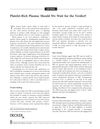June 2014 in “Biotechnology and Bioprocess Engineering” Injecting lab-grown hair cells into the scalp can regrow hair.
13 citations,
May 2021 in “FASEB bioAdvances” Plant-based products can improve hair and skin health without harmful side effects.
 August 2023 in “Theoretical and Natural Science”
August 2023 in “Theoretical and Natural Science” Fat stem cells help rejuvenate skin, reduce wrinkles, lighten skin, and promote hair growth.
 December 2023 in “Scientific Reports”
December 2023 in “Scientific Reports” Scientists created cell lines from balding patients and found that cells from the front of the scalp are more affected by hormones that cause hair loss than those from the back.
August 2024 in “International Journal of Pharmaceutics” The treatment promotes hair growth, improves hair density, and reduces skin irritation.
 4 citations,
January 2020 in “Lasers in Surgery and Medicine”
4 citations,
January 2020 in “Lasers in Surgery and Medicine” Using a 308-nm excimer lamp with minoxidil promotes hair growth in Alopecia Areata patients, especially younger ones or those with smaller bald spots.
February 2022 in “Indian Journal of Traditional Knowledge” The medicated hair oil controls dandruff and promotes hair growth.
2 citations,
January 2023 Nano-sized molybdenum may help treat hair loss and works well with minoxidil.
 4 citations,
May 2014 in “Journal of Cutaneous Medicine and Surgery”
4 citations,
May 2014 in “Journal of Cutaneous Medicine and Surgery” Platelet-rich plasma may help with wound healing, hair growth, and skin rejuvenation, but more research is needed to prove its effectiveness.
 15 citations,
October 2017 in “Dermatologic Clinics”
15 citations,
October 2017 in “Dermatologic Clinics” New treatments for male hair loss show promise but need more research for safety and effectiveness.
 September 2023 in “Medicine”
September 2023 in “Medicine” The research suggests immune system changes and specific gene expression may contribute to male hair loss, proposing potential new treatments.
 January 2019 in “Springer eBooks”
January 2019 in “Springer eBooks” PRP and LLLT can improve hair growth in AGA, but more research needed.
 178 citations,
August 2016 in “Advances in wound care”
178 citations,
August 2016 in “Advances in wound care” New effective scar treatments are urgently needed due to the current options' limited success.

Minoxidil is the only approved cream for hair loss, but new treatments are being looked into.

Some TikTok hair loss remedies like rosemary oil, onion juice, and garlic gel show promise, but more research is needed and they might delay proper treatment.
29 citations,
May 1975 in “Clinical Endocrinology” Combination therapy significantly reduces testosterone and moderately reduces hair growth in women with hirsutism.
 32 citations,
November 2012 in “Aesthetic Surgery Journal”
32 citations,
November 2012 in “Aesthetic Surgery Journal” Hair restoration surgery has advanced, focusing on natural results and may improve further with new techniques and therapies.
63 citations,
September 2020 in “Frontiers in Microbiology” Probiotics show promise for health benefits but need more research to understand how they work.
 February 2021 in “Journal of The American Academy of Dermatology”
February 2021 in “Journal of The American Academy of Dermatology” Fibrosis in the bulge area of hair follicles can cause hair thinning in male pattern baldness, and drugs that inhibit fibrosis might help reverse this.
 57 citations,
May 2007 in “Nature”
57 citations,
May 2007 in “Nature” Adult mice can grow new hair from skin wounds.
 236 citations,
July 2001 in “Trends in Molecular Medicine”
236 citations,
July 2001 in “Trends in Molecular Medicine” Future hair loss treatments should aim to extend hair growth, reactivate resting follicles, reverse shrinkage, and possibly create new follicles, with gene therapy showing promise.
 December 2020 in “Actas Dermo-Sifiliográficas”
December 2020 in “Actas Dermo-Sifiliográficas” LLLT increases hair density and growth in AGA patients.
 1 citations,
August 2023 in “The Journal of Pathology”
1 citations,
August 2023 in “The Journal of Pathology” Different types of skin fibroblasts have unique roles in skin health and disease.
 December 2024 in “PLoS ONE”
December 2024 in “PLoS ONE” Hair growth serums A and C can affect hair growth genes and pathways, suggesting potential for personalized hair loss treatments.
 63 citations,
September 2009 in “Regenerative Medicine”
63 citations,
September 2009 in “Regenerative Medicine” Scientists found a way to grow human hair cells in a lab that can create new hair when transplanted.
 8 citations,
July 2019 in “Cell Proliferation”
8 citations,
July 2019 in “Cell Proliferation” Researchers found a way to turn skin cells into cells that can grow new hair.
 2 citations,
September 2016 in “Journal of skin and stem cell”
2 citations,
September 2016 in “Journal of skin and stem cell” Acne is strongly linked to high BMI, hair loss, menstrual issues, family history, and eating too many sweets and fatty foods, but not to excessive hair growth.

Using microneedling with PRP improves skin and hair conditions more than microneedling alone.
 22 citations,
August 2017 in “Stem cells and cloning”
22 citations,
August 2017 in “Stem cells and cloning” Stem cell technologies and regenerative medicine, including platelet-rich plasma, show promise for hair restoration in treating hair loss, but more research is needed.
 June 2023 in “Stem cell reviews and reports”
June 2023 in “Stem cell reviews and reports” Stem cell therapies could be a promising alternative for hair loss treatment, but more research is needed to understand their full potential and safety.






















